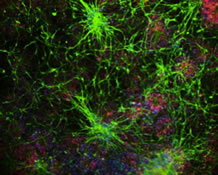Columbia University
Irving Medical Center
Neurological Institute
710 West 168th Street, 3rd floor
(212) 305-1818
Featured Research
IN THE LAB:
Gil Di Paolo, PhD

Gil Di Paolo, PhD
Research in our laboratory broadly focuses on understanding lipid signaling and its relevance in brain physiology and pathophysiology. At the cellular level, our main goal is to delineate the lipid-based mechanisms involved in the control of endolysosomal trafficking and autophagy. We elected to focus on these pathways due to their critical importance in maintaining neuronal homeostasis. Another major research goal is to determine whether perturbations of lipid signaling along the endolysosomal and autophagic pathways can underlie pathogenic processes primarily in Alzheimer's disease, but also in other neurodegenerative disorders, such as Parkinson's and Huntington's disease. Finally, a growing research focus in our laboratory is in the area of biomarker discovery. Here, our main goal is to identify lipid biomarkers from human biospecimens (e.g., plasma, cerebrospinal fluid) that can be diagnostic for neurodegenerative disorders or predictive of disease onset or severity. Although they are not genetically encoded, lipids are attractive metabolites from the point of view of biomarker discovery because of their great chemical diversity and functional properties. Additionally, changes in lipid levels can inform us of dysregulation of specific molecular pathways because lipid metabolizing enzymes are typically key components of regulatory networks within cells, tissues or organisms.
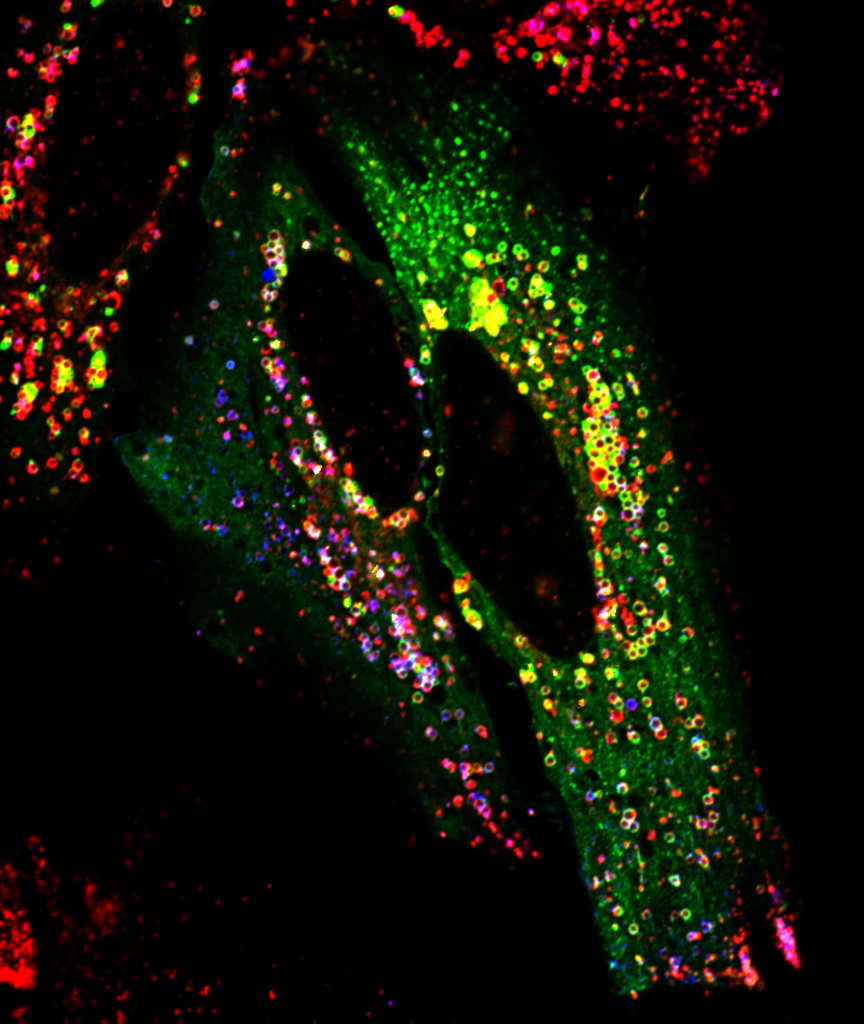
Labeling of the endolysosomal organelles and 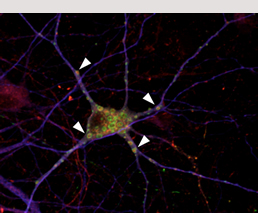 |
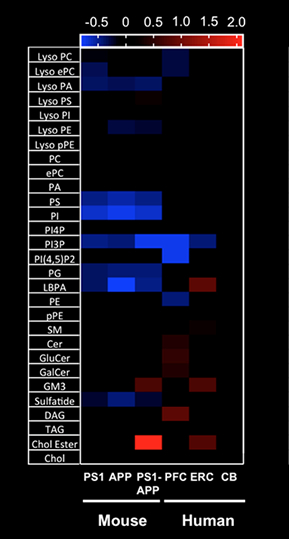 |
Sorting of APP into artificially enlarged
|
Heatmap showing lipid changes in AD mouse
|
To address these fundamental questions, our lab has historically employed multidisciplinary approaches, which range from cell biological techniques, protein and lipid biochemistry, to mouse genetics and behavioral assessments of genetically-modified mice. Importantly, we have successfully developed novel technologies to interrogate lipid metabolism using state-of-the-art mass spectrometry-based approaches, commonly referred to as "lipidomics". We now routinely profile lipid species from four main classes of lipids (glycerolipids, glycerophospholipids, sterols and sphingolipids), comprising over 500 individual lipid species.
The various Di Paolo laboratory members focus on the following areas:
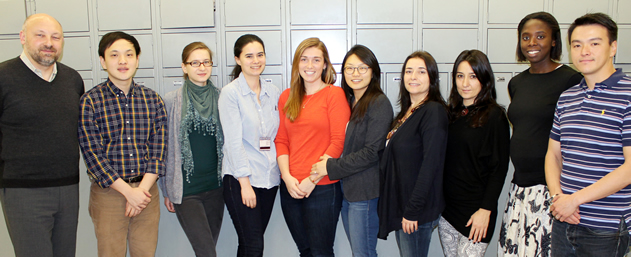 Members of the laboratory, from left to right, Gil Di Paolo,
Bowen Zhou,
Zofia Lasiecka,
Catherine Marquer,
Rebecca Williamson,
Youngjoo Yang,
Elizabeta Micevska,
Claudia Dall'Armi,
Kimberly Point du Jour, and
Robin Chan.
|
Robin Chan, Ph.D., is an Associate Research Scientist who co-founded the Lipidomics Core in the Department of Pathology and Cell Biology as well as the Taub Institute. He oversees all the lipidomics projects in the laboratory and the collaborations with other CUMC or outside investigators. His own research focuses on lipid biomarker discovery in the area of neurodegenerative diseases.
Claudia Dall'Armi, Ph.D., is an Associate Research Scientist who spearheaded an autophagy research program in the laboratory and focuses on the role of phospholipase D and its lipid product phosphatidic acid in lysosomal function and autophagy.
Zofia Lasiecka, Ph.D., is a Postdoctoral Research Scientist who focuses on the role of class III PI 3-kinase Vps34 and its product PI3P in the control of endolysosomal and autophagy pathways in neurons in vitro and in vivo, as well as the relevance of this lipid in Alzheimer's disease.
Catherine Marquer, Ph.D., is a Postdoctoral Research Scientist who investigates the role of small GTPases of the Arf family in the control of cholesterol metabolism and endolysosomal traffic, as well as the significance of these proteins in Alzheimer's disease.
Kimberly Point du Jour, M.D., Ph.D., is a Postdoctoral Research Scientist who focuses on the role of phospholipase D1 and its lipid product phosphatidic acid in the trafficking and processing of Amyloid Precursor Protein.
Rebecca Williamson is an M.D./Ph.D. student who investigates the role of ubiquitination in the trafficking and processing of Amyloid Precursor Protein.
Youngjoo Yang is a graduate student from the Pathology Program who examines the relationship between the retromer trafficking pathway and autophagy.
Bowen Zhou is a Research Technician who helps with all the lipidomic analyses and developed his own research project trying to understand the role of sphingolipid dysregulation in the pathogenesis of Niemann-Pick Type C, a lysosomal/cholesterol storage disorder.
Elizabeta Micevska is a Senior Research Technician who operates as the Di Paolo Lab Manager and is in charge of maintaining the mouse colony.
In addition, our laboratory is involved in a number of collaborations with other Taub Investigators, such as Drs. Scott Small (and co-worker Sabrina Simoes, Ph.D.), Karen Duff, Tae-wan Kim, Nicole Schupf, and Karen Marder.

